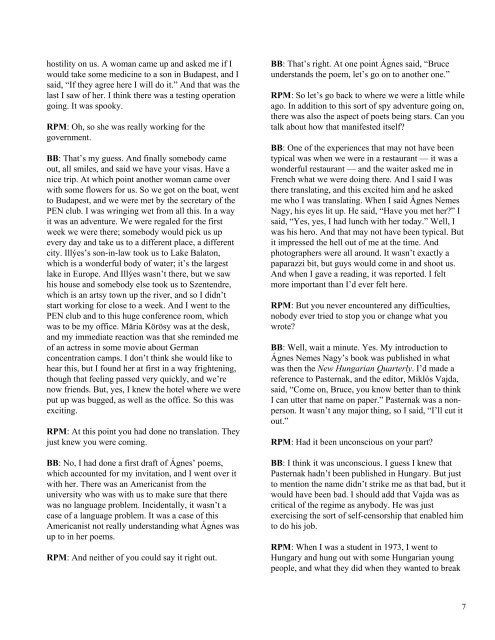their - The University of Texas at Dallas
their - The University of Texas at Dallas
their - The University of Texas at Dallas
Create successful ePaper yourself
Turn your PDF publications into a flip-book with our unique Google optimized e-Paper software.
hostility on us. A woman came up and asked me if I<br />
would take some medicine to a son in Budapest, and I<br />
said, “If they agree here I will do it.” And th<strong>at</strong> was the<br />
last I saw <strong>of</strong> her. I think there was a testing oper<strong>at</strong>ion<br />
going. It was spooky.<br />
RPM: Oh, so she was really working for the<br />
government.<br />
BB: Th<strong>at</strong>’s my guess. And finally somebody came<br />
out, all smiles, and said we have your visas. Have a<br />
nice trip. At which point another woman came over<br />
with some flowers for us. So we got on the bo<strong>at</strong>, went<br />
to Budapest, and we were met by the secretary <strong>of</strong> the<br />
PEN club. I was wringing wet from all this. In a way<br />
it was an adventure. We were regaled for the first<br />
week we were there; somebody would pick us up<br />
every day and take us to a different place, a different<br />
city. Illýes’s son-in-law took us to Lake Bal<strong>at</strong>on,<br />
which is a wonderful body <strong>of</strong> w<strong>at</strong>er; it’s the largest<br />
lake in Europe. And Illýes wasn’t there, but we saw<br />
his house and somebody else took us to Szentendre,<br />
which is an artsy town up the river, and so I didn’t<br />
start working for close to a week. And I went to the<br />
PEN club and to this huge conference room, which<br />
was to be my <strong>of</strong>fice. Märia Körösy was <strong>at</strong> the desk,<br />
and my immedi<strong>at</strong>e reaction was th<strong>at</strong> she reminded me<br />
<strong>of</strong> an actress in some movie about German<br />
concentr<strong>at</strong>ion camps. I don’t think she would like to<br />
hear this, but I found her <strong>at</strong> first in a way frightening,<br />
though th<strong>at</strong> feeling passed very quickly, and we’re<br />
now friends. But, yes, I knew the hotel where we were<br />
put up was bugged, as well as the <strong>of</strong>fice. So this was<br />
exciting.<br />
RPM: At this point you had done no transl<strong>at</strong>ion. <strong>The</strong>y<br />
just knew you were coming.<br />
BB: No, I had done a first draft <strong>of</strong> Ágnes’ poems,<br />
which accounted for my invit<strong>at</strong>ion, and I went over it<br />
with her. <strong>The</strong>re was an Americanist from the<br />
university who was with us to make sure th<strong>at</strong> there<br />
was no language problem. Incidentally, it wasn’t a<br />
case <strong>of</strong> a language problem. It was a case <strong>of</strong> this<br />
Americanist not really understanding wh<strong>at</strong> Ágnes was<br />
up to in her poems.<br />
RPM: And neither <strong>of</strong> you could say it right out.<br />
BB: Th<strong>at</strong>’s right. At one point Ágnes said, “Bruce<br />
understands the poem, let’s go on to another one.”<br />
RPM: So let’s go back to where we were a little while<br />
ago. In addition to this sort <strong>of</strong> spy adventure going on,<br />
there was also the aspect <strong>of</strong> poets being stars. Can you<br />
talk about how th<strong>at</strong> manifested itself<br />
BB: One <strong>of</strong> the experiences th<strong>at</strong> may not have been<br />
typical was when we were in a restaurant — it was a<br />
wonderful restaurant — and the waiter asked me in<br />
French wh<strong>at</strong> we were doing there. And I said I was<br />
there transl<strong>at</strong>ing, and this excited him and he asked<br />
me who I was transl<strong>at</strong>ing. When I said Ágnes Nemes<br />
Nagy, his eyes lit up. He said, “Have you met her” I<br />
said, “Yes, yes, I had lunch with her today.” Well, I<br />
was his hero. And th<strong>at</strong> may not have been typical. But<br />
it impressed the hell out <strong>of</strong> me <strong>at</strong> the time. And<br />
photographers were all around. It wasn’t exactly a<br />
paparazzi bit, but guys would come in and shoot us.<br />
And when I gave a reading, it was reported. I felt<br />
more important than I’d ever felt here.<br />
RPM: But you never encountered any difficulties,<br />
nobody ever tried to stop you or change wh<strong>at</strong> you<br />
wrote<br />
BB: Well, wait a minute. Yes. My introduction to<br />
Ágnes Nemes Nagy’s book was published in wh<strong>at</strong><br />
was then the New Hungarian Quarterly. I’d made a<br />
reference to Pasternak, and the editor, Miklós Vajda,<br />
said, “Come on, Bruce, you know better than to think<br />
I can utter th<strong>at</strong> name on paper.” Pasternak was a nonperson.<br />
It wasn’t any major thing, so I said, “I’ll cut it<br />
out.”<br />
RPM: Had it been unconscious on your part<br />
BB: I think it was unconscious. I guess I knew th<strong>at</strong><br />
Pasternak hadn’t been published in Hungary. But just<br />
to mention the name didn’t strike me as th<strong>at</strong> bad, but it<br />
would have been bad. I should add th<strong>at</strong> Vajda was as<br />
critical <strong>of</strong> the regime as anybody. He was just<br />
exercising the sort <strong>of</strong> self-censorship th<strong>at</strong> enabled him<br />
to do his job.<br />
RPM: When I was a student in 1973, I went to<br />
Hungary and hung out with some Hungarian young<br />
people, and wh<strong>at</strong> they did when they wanted to break<br />
7

















